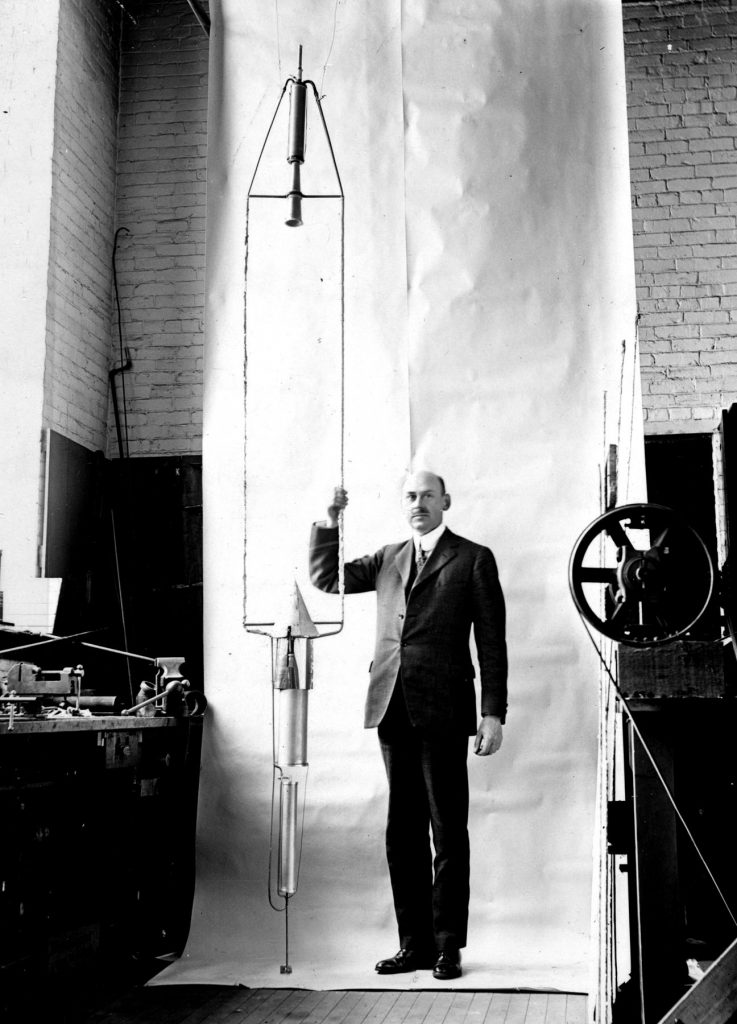
Throughout July we’re taking an in-depth look at Proverbs, the Bible’s one-of-a-kind book about our never-ending need for wisdom.
Within the past two weeks, billionaires Richard Branson and Jeff Bezos have literally launched humanity’s latest round of exploration – the opportunity for ordinary people (at least the ones who happen to have a great deal of discretionary income) to experience a few moments in space.
Interestingly, space exploration as we have always known it began in a cherry tree.
On October 19, 1889, when rocket pioneer Robert Goddard was 17 years old, he climbed the tree on his family’s farm in Worcester, Massachusetts. While sitting on its branches, “I imagined how wonderful it would be to make some device which had even the possibility of going to Mars.”
Goddard later reflected, “I was a very different boy when I descended the tree.”
His vision of creating workable, reusable rockets had to survive some pretty serious obstacles.
The neighbors, for instance, got tired of the explosions coming from Goddard’s experiments. The Massachusetts state fire marshal told Goddard he would have to take his rockets and go somewhere else. With help from Charles Lindbergh, Goddard found a desolate place out West to continue experimenting: Roswell, New Mexico.
Then there’s the New YorkTimes, which openly mocked him in a 1920 article.
Goddard had proposed that a rocket could travel from the earth to the moon. Yeah, right, said the Times.
“That Professor Goddard, with his ‘chair’ in Clark College, and the countenancing of the Smithsonian Institution, does not know the relation of action to reaction and the need to have something better than a vacuum against which to react – to say that would be absurd. Of course he only seems to lack the knowledge ladled out daily in high schools.”
And you thought it was the end of the world when one of your former high school classmates ripped you on her Facebook page.
Goddard didn’t give up. And it’s a good thing.
On July 17, 1969 – 49 years later – the Times printed a retraction. Twenty-four hours earlier, Apollo 11 had begun its historic trip to the moon. The newspaper included this statement: “It is now definitely established that a rocket can function in a vacuum. The Times regrets the error.”
We can’t always outlive our critics. Sometimes we simply have to continue doing what we have come to believe is right.
The “umbrella topic” of Proverbs is wisdom. Its number one application, as reflected by the sheer volume of verses, is speech. But right behind that comes work. Proverbs exalts the value of working hard and sticking with it. If we embrace such an approach to life, the odds go way up that our lives will go well:
“A slack hand causes poverty, but the hands of the diligent makes rich” (10:4). “I passed by the field of one who was lazy, by the vineyard of a stupid person; and see, it was all overgrown with thorns; the ground was covered with nettles, and its stone wall was broken down. Then I saw and considered it; I looked and received instruction. A little sleep, a little slumber, a little folding of the hands to rest, and poverty will come upon you like a robber, and want, like an armed warrior” (24:30-34). “The soul of the sluggard craves and gets nothing, while the soul of the diligent is richly supplied” (13:4)
Here we need to confront one of the prevailing Christian myths of our time – the notion that work is somehow second best when it comes to the things of God.
All too often work is treated as a Have-To – something I’m compelled to do for endless hours so I can pay my light bill and put food on the table. After all, didn’t God tell Adam in Genesis 3 that one of the punishments for eating the forbidden fruit was that the ground was now cursed, and that “by the sweat of your face you will eat bread”? That makes every workday seem like Monday.
But in the original creation mandate of Genesis 2, work is clearly a Get-To. Human labor was intended to bring deep joy.
Sermons and seminars routinely call out the reality of “hurry sickness” – our culture’s addiction to trivial distractions, never-ending activities squeezed into fewer hours, and items checked off our To Do lists as the validation of our worthiness as human beings.
But hurried, disordered lives don’t negate the goodness of God’s original gift. From the beginning, men and women were called to work.
And that call has not been revoked.
This week you may need to weed a garden. Or write a computer algorithm that will improve your company’s accounting processes. Or prepare a presentation for a retreat. Or fix the gutters on your house. Or take a group of children on a “creek walk” in a nearby park. Or make strategic decisions about the direction of an entire industry. Or work your way through a massive pile of laundry.
Get after it, says the author of Proverbs. Bring your A Game. Keep working so you can finish well.
Tackling important and meaningful tasks – whether or not you ever see a paycheck – is one of the best things in life. Our work, after all, is one of God’s primary means of accomplishing his work in this world.
As long as he lived, Robert Goddard considered October 19 his “Anniversary Day.” Each year he returned on that date to his family’s farm to visit the cherry tree. Standing beside it, he rekindled his commitment to succeed, no matter what obstacles he faced.
Don’t quit working just because you have critics.
Who knows? They may still be around when your hard work and big ideas finally blast off.
